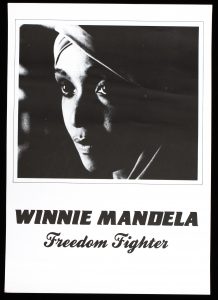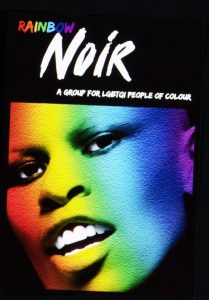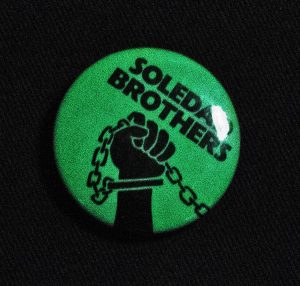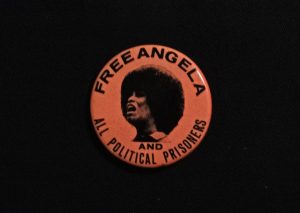A display of four objects highlighting protest movements, revolutionary figures and organisations from Black history, selected on the Black History Month 2022 theme ‘Time for Change: Actions not Words’.
 Winnie Mandela Print, around 1980
Winnie Mandela Print, around 1980Winnie Madikizela-Mandela was a South African anti-apartheid activist and politician. South African apartheid was a system of institutionalised racial segregation that ensured the political, social and economic dominance of the minority white population.
Winnie Mandela rose to prominence through protesting and campaigning while her husband, Nelson Mandela, was imprisoned. She became known for violent retaliation against those who co-operated with apartheid and this has dominated the focus on her life, rather than her revolutionary work. We chose this print to acknowledge her presence and activism throughout the anti-apartheid campaign, the Federation of South African women, and South African politics – amidst state violence, misogyny and brutality.

Rainbow Noir is a volunteer led action group founded in 2013, which celebrates and platforms Black people and people of colour who identify as LGBTQI+.
The group aims to create safe spaces, foster community, affirm identity and raise visibility. LGTBQI+ Black people are often forgotten, silenced and sidelined, yet black people have historically been at the centre of queer liberation movements.
Angela Davis is an American activist and scholar. She was active in the Black Power movement as well as being the founder of Critical Resistance, an organisation working to abolish the prison industrial complex – the relationship between a government and the various businesses that benefit from institutions of incarceration, such as prisons.


Davis was a supporter of the ‘Soledad Brothers’, three inmates of California’s Soledad Prison, George Jackson, Fleeta Drumgo and John Clutchette, who were accused of killing prison guard John Vincent Mills. Davis became a global symbol of the civil rights movement with her arrest following an attempted courthouse hold up by George Jackson’s brother Jonathan Jackson, in demand of the freedom of the Soledad Brothers. A gun purchased legally by Davis had been used in the hold up of the courthouse, where a judge was taken hostage. Jonathan Jackson, the judge, and two Black defendants were killed.
Davis was charged with kidnapping and murder, and was arrested and incarcerated. Global campaigns and protests were organised to free her from prison, leading to the Free Angela Davis campaign. After 16 months she was found not guilty, as her ownership of the gun used in the crime did not justify accusing her of the crimes committed. Davis continued to be an extraordinary revolutionary figure, working within feminist, Black, queer and socialist spaces.
Display suitable for all ages.